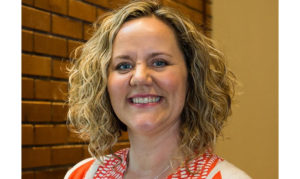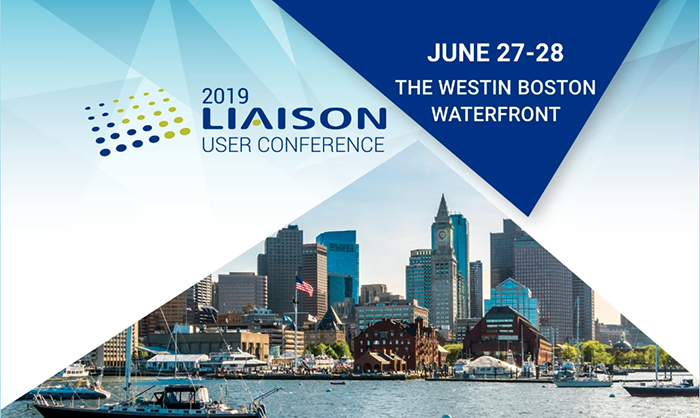Liaison’s Leah Bianchi recently caught up with Kerry Callahan Mandulak, PhD, CCC-SLP, an associate professor at Pacific University’s School of Communication Sciences and Disorders. Dr. Mandulak also chairs Liaison’s Communication Sciences and Disorders Centralized Application ServiceTM (CSDCASTM) Advisory Board on behalf of the Council on Academic Programs in Communication Sciences and Disorders (CAPCSD). Dr. Mandulak, who will be a presenter at the Liaison User Conference later this month, talks about her upcoming visit to Boston for the event.
Leah Bianchi (LB), Liaison: How long have you been with Pacific University? What did you do before this role?
 Dr. Kerry Mandulak, Pacific University (KM): I’ve been in academia for 10 years. I’ve been at Pacific for the last seven. In addition to being an associate professor at the School of Communication Science and Disorders (CSD) I am also the chair of our graduate admissions committee. I work closely with our graduate admissions director. Previously, I was an assistant professor at Portland State University for three years.
Dr. Kerry Mandulak, Pacific University (KM): I’ve been in academia for 10 years. I’ve been at Pacific for the last seven. In addition to being an associate professor at the School of Communication Science and Disorders (CSD) I am also the chair of our graduate admissions committee. I work closely with our graduate admissions director. Previously, I was an assistant professor at Portland State University for three years.
Before that, I was on the graduate admissions committee as a doctoral student at the University of North Carolina at Chapel Hill. That was where my interest in admissions began. And then, at Pacific, I decided to apply for the CSDCAS committee through CAPCSD. I was appointed to the committee, and for the past two years, I have been the chair. That’s what really got me working with Liaison.
(LB): How long have you worked with Liaison’s products and services? What has your experience with Liaison been?
(KM): I have used CSDCAS for graduate admissions at both Portland State and Pacific. I was appointed to the CSDCAS committee in 2015 and that’s when I really got a behind-the-scenes look at Liaison. When I visited the Liaison office I had the opportunity to see how everything worked and to appreciate what happens behind the scenes at Liaison – the way applications come into the office, and then the scanning and the verification. It really connected the dots for me about how to help students better manage and navigate their graduate management admissions experience. But the best part of my experience at Liaison was the opportunity to learn so much about admissions across the health professions, and about the entire industry in general. It inspired me.
Karen Jacobs at Liaison really transformed our process at Pacific and helped us use WebAdMITTM to its fullest potential. I attribute so much of my professional development around admissions to being connected with the SCDCAS team at Liaison.
When I became chair of the CSDCAS committee, Julie Masterson, the outgoing chair, said, “Kerry, no one else is doing this work around admissions in speech pathology. There’s legitimate science behind admissions.” So I called Robert Ruiz, Liaison’s vice president of strategic enrollment, and we ended up talking for an hour and a half. It was supposed to be 30 minutes, but he spent that time helping me get my mind wrapped around what we could really be doing with admissions in our industry to increase diversity and to shake up the current paradigm. That really inspired me.
(LB): What are you looking forward to at the Liaison User Conference?
(KM): For me, the benefit of these conferences is always the opportunity to talk to people face to face. I like being able to network, connect and problem solve together. I also get inspired to hear what other people are doing to make things more efficient. I love to think about how I can connect that back to my work and how I can improve our processes. And I think the best opportunity to do all that is when everyone is together in the same room. That’s where ideas come to life. Connecting with people gives me a lot of energy.

(LB): Do you frequent conferences like this one? If so, what tips do you have for attendees to help them get the most out of the conference?
(KM): The type of conferences I usually go to are more academic in nature, where people are presenting research. So this is new for me and I’m excited about that. Even though the health professions are all vastly different, we also have a lot in common in terms of what we’re trying to do around admissions and getting great students.
(LB): You submitted a session via our Call for Speakers and we were quite excited to accept it. Can you give readers an overview of what inspired your proposal?
(KM): Holistic review is not something that’s been talked about a lot in the speech pathology and audiology profession. I was on sabbatical the entire spring semester doing a deep dive into our own process at Pacific and how we use holistic review here. I think one of the main deterrents to people considering holistic reviews is the question of whether it is going to create more work. Is it going to take more time and effort? So I’m inspired to talk about how you can use WebAdMIT to help with holistic reviews in a way that doesn’t take up any additional time. In fact, you can probably save time but actually, get better results and students that fit your program better. I’m really excited to explore that concept with other users of WebAdMIT.
(LB): Who do you believe would get the most out of attending your session (e.g., current CAS users, people considering CAS, etc.)?
(KM): In addition to current CAS users and people considering a CAS, admissions professionals who are interested in holistic reviews and who are thinking about admissions in a different way will also benefit, particularly those in fields that are fairly competitive. It’s important to think about how to maintain really high admissions standards, and also to think about widening the lens to see who else might be a best-fit for your program. All of our programs have different strengths and weaknesses. I think that if we can do a better job of matching applicants and programs, then everyone will have a better experience.
(LB): Anything non-conference related that you’re looking forward to while you’re visiting Boston?
(KM): I’m glad to have the opportunity to be with my colleagues from CSDCAS. That’s always really rewarding. But I also look forward to being in Boston — being along the waterfront, walking along the river, and just seeing everyone out and enjoying what that city has to offer. And I also love the history and the academic feel to the city. That’s why I love being in Boston.
